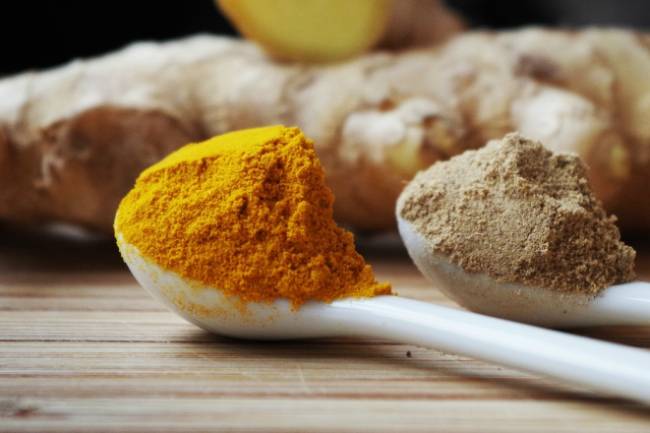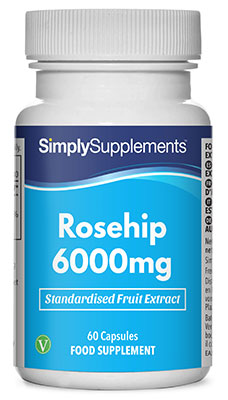Rosehips for Joint Pain and Arthritis

Rosehips are the bright red seed pods of wild roses often seen in autumn hedgerows. Their bright colouration and juicy innards make them a popular food for birds, but they also represent a powerhouse of nutrition for people too.
Whilst our ancestors have been using rosehips for generations to make jellies and jams, there is growing evidence that they may also offer some impressive health benefits too.
For one thing, rosehips are one of the richest natural sources of vitamin C, containing up to 50% more than oranges. This makes them ideal for supporting a healthy immune system.
Rosehips are also celebrated for being packed full of antioxidant polyphenols and anthocyanins; perfect for helping protect the body from free radicals. Just as importantly, however, an increasing number of people are using rosehips to help them fight joint pain and arthritis.
What is Arthritis?
Arthritis comes in many different forms, but the most common type is known as “osteoarthritis”. The end of the bones that make up our joints are typically covered in a protective layer of cartilage. This cartilage allows the joint to move smoothly, with no friction between the bones.
Over time, however, this cartilage can start to wear thin - most commonly in response to age. As cartilage wears thin, so the joints do not work as smoothly as before and discomfort can arise.
In more extreme cases the cartilage can wear through completely, resulting in bone rubbing on bone.
As well as being particularly painful, this can encourage the body to lay down extra bone (known as “spurs”) as a preventative mechanism. Sadly, this can worsen pain still further. Whilst arthritis is quite common with age, it can potentially strike at almost any age.
Supplements that are believed to help with arthritic joint pain - such as glucosamine sulphate or hydrochloride, cod liver oil or rosehip - typically act by reducing inflammation. This, in turn, can make joints more comfortable and maintain a fuller range of movement.
Rosehips for Joint Pain
The scientific research surrounding the medicinal benefits of rosehips is still in its infancy. All the same, a number of studies have started to show some very encouraging results. It seems that one of the key benefits offered by rosehips are their ability to reduce inflammation in the body. Understandably this can therefore impact health conditions associated with inflammation, such as pain in the joints. But what is the evidence?
A study conducted in Denmark monitored 300 osteoarthritis patients who took daily rosehip supplements over a three month period. The findings showed that rosehip supplements were three times more effective than standard paracetamol at relieving pain. Having examined the data, researchers hypothesised that rosehips worked by reducing the number of white blood cells building up in the joints and triggering inflammation.
Another study in Germany involved 74 patients with rheumatoid arthritis. Patients were split into two groups; one took a daily rosehip supplement for six months, while patients in the other group took a placebo. Both groups continued to take their usual medication throughout the trial period. Findings showed a 40% fall in pain and discomfort scores in the rosehip group, while there was no change in the placebo group. Activity levels in the rosehip group also improved by 25%.
Other scientific studies have looked less at the joint pain associated with arthritis and more at the functional abilities of those taking rosehip. One group of scientists prescribed either rosehip or a placebo to a group of one hundred arthritis sufferers, and monitored them for changes in mobility. The experts in question found that by the end of the three month experiment those individuals taking the rosehip supplement experienced noticeable improvements in both knee function and general walking ability.
Benefits of Rosehips
As we have seen, there is some impressive evidence to support taking rosehip for arthritis, particularly for their ability to:
- Defend cartilage against wear and tear
- Reduce pain and stiffness
- Reduce inflammation and joint swelling
- Improve joint mobility
- Reduce the need for painkillers
It is worth mentioning one so-called “meta analysis” where the results of a range of tests were combined. The intention of such a study is to take a general overview of all the evidence gathered so far. Considerations are made with regards to how rigorous studies have been, with less impressive studies being eliminated from the study.
This particular meta analysis concluded, however, that “rosehip powder does reduce pain” while another similar study claimed that “rosehip powder had a moderate effect in patients with osteoarthritis”.
Whilst the study of rosehip is still too young to make definitive claims, it does seem that many people experience improvements in arthritis as a result; not just a reduction in joint pain but also mobility; two of the biggest problems associated with arthritis.
How Much Rosehip Should I Take?
Rosehips are available in several different forms, including supplements, herbal teas, tinctures and oils.
Rosehip supplements are the most concentrated source and so offer the greatest health benefits. The dosage you need will depend on the severity of the pain you are experiencing; if you are taking rosehip for arthritis pain you may want to consider taking between 5-14 grams daily.
Ideally, higher intakes should be divided into smaller doses throughout the day.

Sources:
http://www.sciencedirect.com/science/article/pii/S1063458408000654
https://search.proquest.com/openview/d4167223a74397580b0558c77e1b443e/1?pq-origsite=gscholar&cbl=33668
http://europepmc.org/abstract/med/17619600
http://onlinelibrary.wiley.com/doi/10.1002/ptr.3007/full
http://www.sciencedirect.com/science/article/pii/S0966636215007274

 Nicole
Nicole 
























